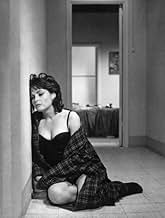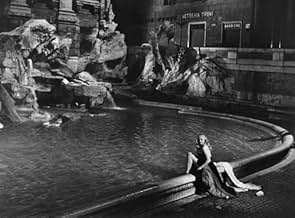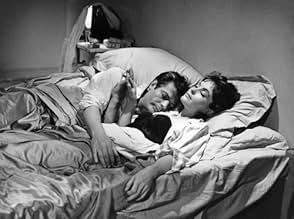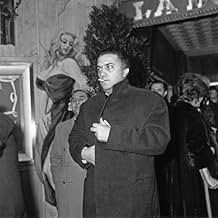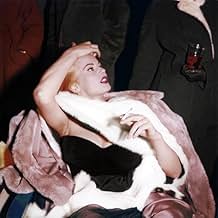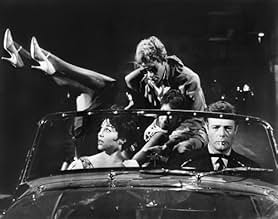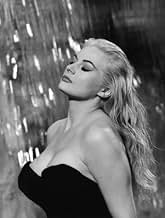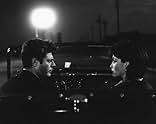La dolce vita
- 1960
- Tous publics
- 2h 54min
Une série d'histoires au fil d'une semaine dans la vie d'un paparazzi coureur de jupons vivant à Rome.Une série d'histoires au fil d'une semaine dans la vie d'un paparazzi coureur de jupons vivant à Rome.Une série d'histoires au fil d'une semaine dans la vie d'un paparazzi coureur de jupons vivant à Rome.
- Réalisation
- Scénario
- Casting principal
- Récompensé par 1 Oscar
- 11 victoires et 12 nominations au total
Anouk Aimée
- Maddalena
- (as Anouk Aimee)
Magali Noël
- Fanny
- (as Magali Noel)
Résumé
Reviewers say 'La Dolce Vita' features American actors portraying real-life celebrities and industry figures, though their exact identities remain unconfirmed. The film delves into themes of fame, decadence, and the superficiality of celebrity culture, using these characters to underscore the contrasts and contradictions within high society. The portrayal of these characters enhances the film's satirical and critical perspective on the lifestyles and attitudes of the era, offering a nuanced commentary on the nature of fame and its impact on individuals and society.
Avis à la une
I first saw this movie probably over 25 years ago when I was quite a bit younger. At that point I enjoyed it for its party scenes, sense of joy and life and vitality and....Marcello Mastroianni. Now that I'm older myself and have just recently seen the movie again, I find that I have a much deeper understanding of it. Maybe it takes some age to find some meaning. In a nutshell, Marcello is at a crossroads in his life, he's unable to settle down or move foreward into any direction - he's a diletante with aspirations but no real goals. He's wrapped up in himself and in projecting rather dreamy ideals onto other people. But as he keeps projecting on to others he comes to find in each situation that he doesn't really know the person and they are a mystery and probably a disappointment to him. certainly steiner is the biggest disappointment and disillusions him to a degree that he is apparently lost to a life of corruption and decadence as a result. but it's not that these people are difficult to understand to someone other than marcello - i think we can see that anita ekberg's character really is just a big good-natured blond and not the mysterious goddess marcello makes her out to be; his father is again - the typical traveling salesman and perhaps not the paternal figure that marcello would like him to be. his amour maddelena lives up to her name even as marcello starts believing himself in love with her - he's literally seduced by nothing more than an image he creates in his own mind. his friend steiner seems to have it all to marcello and to be the renaissance man that he would like to be - but, of course, he is dissatisfied and disturbed and we see what the end is. the only one whom marcello forms a somewhat realistic connection with is his girlfriend whom he treats badly and neglects despite her obvious love for him. he refuses to actually work on the one relationship that he could actually succeed at - he would rather dream about possibilities than actualize something.
marcello cannot communicate with others because he cannot see them as the people they really are - he just sees them as projections of his own needs, aspirations, desires and goals. when he finds out what they're really like, he either turns away or falls apart. this is an outstanding movie - 10 out of 10 and beautifully photographed. if you don't get it now, try again in 10 years - it will wait for you to catch up.
marcello cannot communicate with others because he cannot see them as the people they really are - he just sees them as projections of his own needs, aspirations, desires and goals. when he finds out what they're really like, he either turns away or falls apart. this is an outstanding movie - 10 out of 10 and beautifully photographed. if you don't get it now, try again in 10 years - it will wait for you to catch up.
I just saw a new print of this wonderful film after not having seen it for maybe 20 years and it is still spellbinding. Fellini sums up an era and an attitude here, and succeeds in doing something that ought to be impossible: he makes a full and meaningful film about empty and meaningless lives. Mastroianni seems to have been to Fellini what DeNiro has been to Scorsese--a perfect embodiment of a personal vision. What a wonderful actor he was--brilliant in his youth and in his age. Many other performers are hardly less fine here, and the cinematography and composition are stunning throughout. There are so many indelible images from this film, images that have become iconic over the decades: Ekberg in the Fontana di Trevi, the statue of Christ flying over Rome, the astonishing, candlelit procession at the castle, to name a few. It seems plot less and yet it isn't plot less at all; Marcello's ultimately fruitless search for meaning, a search that he abandons in the end, as he stares across a slight and yet unbridgable abyss on the beach at a lovely young girl who seems to possess the knowledge and understanding that is denied to him. I'm astonished at the number of people who don't get this movie, who seem to think that Fellini expects us to admire the bizarre characters who people the film, or who think that a movie about worthless individuals must be a worthless movie, or who don't seem to understand that movies that are full of what become clichés usually do so because they capture an important vision. Fellini made several exceptional films: 81/2, La Strada, Amarcord, and The Nights of Cabiria come to mind, but La Dolce Vita may be, when all is said and done, his masterwork.
LA DOLCE VITA presents a series of incidents in the life of Roman tabloid reporter Marcello Rubini (Marcello Mastroianni)--and although each incident is very different in content they create a portrait of an intelligent but superficial man who is gradually consumed by "the sweet life" of wealth, celebrity, and self-indulgence he reports on and which he has come to crave.
Although the film seems to be making a negative statement about self-indulgence that leads to self-loathing, Fellini also gives the viewer plenty of room to act as interpreter, and he cleverly plays one theme against its antithesis throughout the film. (The suffocation of monogamy vs. the meaninglessness of promiscuity and sincere religious belief vs. manipulative hypocrisy are but two of the most obvious juxtapositions.) But Fellini's most remarkable effect here is his ability to keep us interested in the largely unsympathetic characters LA DOLCE VITA presents: a few are naive to the point of stupidity; most are vapid; the majority (including the leads) are unspeakably shallow--and yet they still hold our interest over the course of this three hour film.
The cast is superior, with Marcello Mastroianni's personal charm particularly powerful. As usual with Fellini, there is a lot to look at on the screen: although he hasn't dropped into the wild surrealism for which he was sometimes known, there are quite a few surrealistic flourishes and visual ironies aplenty--the latter most often supplied by the hordes of photographers that scuttle after the leading characters much like cockroaches in search of crumbs. For many years available to the home market in pan-and-scan only, the film is now in a letterbox release that makes it all the more effective. Strongly recommended.
Gary F. Taylor, aka GFT, Amazon Reviewer
Although the film seems to be making a negative statement about self-indulgence that leads to self-loathing, Fellini also gives the viewer plenty of room to act as interpreter, and he cleverly plays one theme against its antithesis throughout the film. (The suffocation of monogamy vs. the meaninglessness of promiscuity and sincere religious belief vs. manipulative hypocrisy are but two of the most obvious juxtapositions.) But Fellini's most remarkable effect here is his ability to keep us interested in the largely unsympathetic characters LA DOLCE VITA presents: a few are naive to the point of stupidity; most are vapid; the majority (including the leads) are unspeakably shallow--and yet they still hold our interest over the course of this three hour film.
The cast is superior, with Marcello Mastroianni's personal charm particularly powerful. As usual with Fellini, there is a lot to look at on the screen: although he hasn't dropped into the wild surrealism for which he was sometimes known, there are quite a few surrealistic flourishes and visual ironies aplenty--the latter most often supplied by the hordes of photographers that scuttle after the leading characters much like cockroaches in search of crumbs. For many years available to the home market in pan-and-scan only, the film is now in a letterbox release that makes it all the more effective. Strongly recommended.
Gary F. Taylor, aka GFT, Amazon Reviewer
Marcello Rubini (Marcello Mastroianni) is a man-about-town and a gossip journalist in Rome. His girlfriend Emma overdoses and recovers. Swedish-American bombshell Sylvia (Anita Ekberg) arrives and hangs out with Marcello while the Paparazzo hounds them. Her boyfriend Robert gets angry and hits him. As his series of adventures continue, there is an emptiness to it all and a meaninglessness to his life.
This iconic film has a disjointed narrative structure. It has many sections without the connective tissue. It's a tough watch especially for a three hour movie. It's exhilarating for a long time but it gets tiring by the end. The sad emptiness infects the viewing experience. The lifestyle is thoroughly modern celebrity world. The thrill disapates. Its iconic nature deserves extra points, but this is strictly for film fans.
This iconic film has a disjointed narrative structure. It has many sections without the connective tissue. It's a tough watch especially for a three hour movie. It's exhilarating for a long time but it gets tiring by the end. The sad emptiness infects the viewing experience. The lifestyle is thoroughly modern celebrity world. The thrill disapates. Its iconic nature deserves extra points, but this is strictly for film fans.
There really isnt a plot. This is about a tabloid photographer and some scenarios he gets into. All the characters seem vain, selfish and wanting more from life without actually knowing what they want. The Rome nightlife is brought to life here and there are many scenes at lavish parties where all the characters dont appear to have any emotional connection to one another. There are also disconnected Catholic themes throughout the movie. It leaves you questioning your own life and emptiness.
Le saviez-vous
- AnecdotesThe famous scene in the Trevi Fountain was shot over a week in March, when nights were still cold. According to Federico Fellini (in an interview with Costanzo Costantini), Anita Ekberg stood in the cold water in her dress for hours with no trouble. Marcello Mastroianni, on the other hand, had to wear a wetsuit beneath his clothes, and even that wasn't enough. Still freezing, he downed an entire bottle of vodka, so he was completely drunk while shooting the scene.
- GaffesWhen Marcello and Maddalena arrive at the prostitute's apartment, a long electric cable (light?) can be seen attached to the right rear of the car, moving along until the car stops.
- Versions alternativesIn the original American release, distributed by American International Pictures, the titles open with the AIP logo and appear over a shot of the sky with clouds. In the current release on DVD - and as shown on TCM - the title sequence is over a black background. When originally released, censors in several countries trimmed certain scenes, including the orgy near the end of the film.
- ConnexionsEdited into La case du siècle: Cinecittà, de Mussolini à la Dolce Vita (2021)
Meilleurs choix
Connectez-vous pour évaluer et suivre la liste de favoris afin de recevoir des recommandations personnalisées
Détails
- Date de sortie
- Pays d’origine
- Site officiel
- Langues
- Aussi connu sous le nom de
- La douceur de vivre
- Lieux de tournage
- Villa Giustiniani-Odescalchi, Bassano Romano, Viterbo, Lazio, Italie(abandoned castle scenes)
- Sociétés de production
- Voir plus de crédits d'entreprise sur IMDbPro
Box-office
- Montant brut mondial
- 217 420 $US
- Durée2 heures 54 minutes
- Couleur
- Rapport de forme
- 2.35 : 1
Contribuer à cette page
Suggérer une modification ou ajouter du contenu manquant


![Regarder Trailer [English SUB]](https://m.media-amazon.com/images/M/MV5BNjE3MTU3OTItN2I0NS00YzU2LWE1ZTctZDQ3Y2I1NDc4MGMxXkEyXkFqcGdeQXRyYW5zY29kZS13b3JrZmxvdw@@._V1_QL75_UX500_CR0)
![La Dolce Vita: [2-Disc Collectors Edition]](https://m.media-amazon.com/images/M/MV5BZTY2ZTg3YmEtZDZkMS00MmFkLThhMjItMWVmN2NlNmJhZGZjXkEyXkFqcGdeQXVyNzU1NzE3NTg@._V1_QL75_UX500_CR0)

